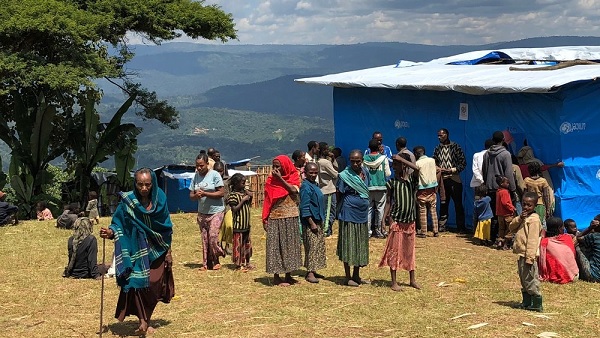
ADDIS ABABA/NAIROBI – Médecins Sans Frontières (MSF) is concerned for the welfare of tens of thousands of vulnerable internally displaced people (IDPs) in southern Ethiopia, following an assessment that revealed alarming findings about their nutritional status, poor living conditions and limited availability of safe drinking water.
In response, MSF has launched an emergency intervention in the Gedeo area of the Southern Nations, Nationalities, and Peoples’ Region (SNNPR), southern Ethiopia, and is calling on humanitarian agencies to urgently scale up their support for the IDPs in the numerous camps in the area.
After screening children aged under five at eight IDP sites in the Gedeb woreda (district) of Gedeo at the end of March, MSF teams found rates of severe acute and global acute malnutrition to be well above the emergency threshold. While they were not part of the assessment, MSF also saw a high number of malnourished pregnant women.
“We saw an immediate need to scale up the response for the treatment of malnourished children, as the few facilities in the area were completely overwhelmed and could not offer the specialized care needed for children with complications,” said Markus Boening, MSF field coordinator in Gedeo. “One of the biggest problems is that malnourished children are arriving too late to be treated, which shows there are gaps in the community outreach component of the current response.”
MSF teams are now supporting the Regional Health Bureau with a focus on nutrition. So far, they have treated more than 200 children aged under five for severe acute malnutrition in two stabilization centers and seen over 50 pediatric patients.
The response will expand in the coming days to include improving the water and sanitation conditions in some of the IDP camps and informal settlements, including increasing access to clean water supplies and latrines. Local health authorities have reported several thousand cases of watery diarrhea in recent weeks.
“The camps are overcrowded and in extremely poor condition,” said Boening. “The people living there are at risk from outbreaks of diseases. Their health is very vulnerable after being forced to move so many times.”
MSF has returned to Gedeo only three months after closing one of our largest emergency interventions of 2018, which was launched after a massive number of people were displaced by ethnic violence.
Read the complete story at Médecins Sans Frontières (MSF)
